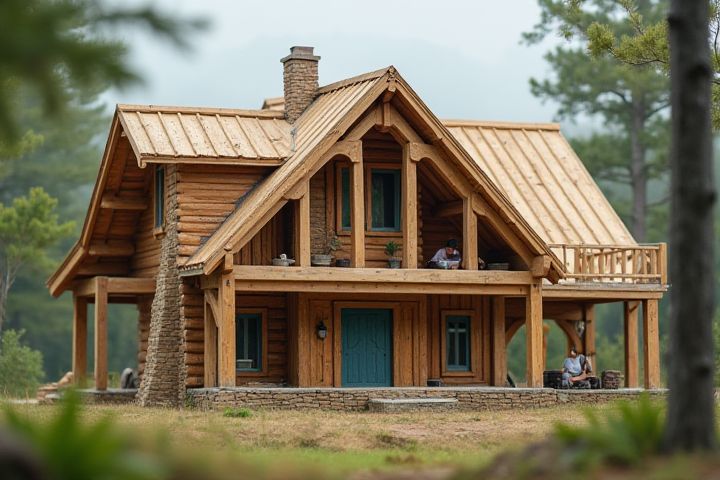
Building a house yourself is an ambitious project that requires careful planning, a solid understanding of construction techniques, and the necessary tools. From drafting blueprints and securing permits to choosing materials and managing labor, overseeing every aspect is essential for success. You must also be knowledgeable about local building codes and zoning laws, as compliance is crucial to avoid legal issues. Don't underestimate the time commitment and physical labor involved, as even experienced builders face challenges. Engaging with professionals for certain tasks, such as electrical or plumbing work, can enhance safety and ensure the functionality of your new home.
Can I Build A House Myself
Local building codes
Yes, you can build a house yourself, but it's essential to familiarize yourself with local building codes. These regulations outline safety standards, zoning laws, and construction guidelines that must be adhered to during the building process. Contact your local building authority to obtain the necessary permits and ensure compliance with electrical, plumbing, and structural codes. Your understanding of these requirements will not only streamline the construction process but also protect your investment and ensure the safety of your future home.
Required permits
Building a house yourself often requires obtaining specific permits to ensure compliance with local building codes and regulations. You may need a building permit, zoning approval, and possibly inspections during various construction phases, depending on your location. Contact your local building department to understand the exact permits necessary for your project and any fees associated with them. Failure to secure the required permits can result in costly fines and may impede the progress or legality of your construction.
Construction skills needed
Building a house yourself requires a solid foundation in essential construction skills, such as carpentry, plumbing, and electrical work. You should be proficient in using tools like saws, drills, and hammers, as well as understanding building codes and safety regulations. Knowledge of framing and roofing techniques is crucial for structural integrity, while familiarity with drywall installation and finishing can enhance your interior aesthetics. Strong project management skills will help you coordinate various tasks, timelines, and materials efficiently, ensuring your construction project progresses smoothly.
Cost estimation
Building a house yourself can significantly reduce labor costs, allowing you to allocate your budget towards materials and permits. It's essential to conduct a detailed cost estimation that includes expenses such as land acquisition, construction materials, utilities installation, and interior finishes. Consider unexpected costs like permits and inspections, which may not be immediately apparent. By accurately estimating these factors, you can determine the feasibility of your DIY project and make informed decisions about your budget.
Timeline for completion
Building a house yourself is a manageable undertaking, but the timeline for completion can vary significantly based on several factors. Typically, a DIY house project can take anywhere from six months to two years, depending on your experience, local regulations, and the complexity of the design. You will need to allocate time for planning, obtaining permits, site preparation, and each construction phase, including framing, roofing, plumbing, and electrical work. Creating a detailed schedule will help you stay on track and ensure each step is completed efficiently, allowing you to move into your new home as planned.
Sourcing materials
You can build a house yourself by strategically sourcing materials from local suppliers, specialty stores, or online marketplaces. Consider purchasing high-quality lumber, concrete, insulation, and roofing materials that meet building codes and standards for energy efficiency. Tools and hardware, such as nails, screws, and fasteners, can often be found at hardware stores or fabricated from reclaimed materials for cost savings. Establishing relationships with suppliers and exploring bulk purchasing options can significantly reduce your overall expenses while ensuring you have all necessary resources for a successful build.
Required tools
Building a house yourself is an ambitious but rewarding project that requires specific tools to ensure precision and safety. Essential tools include a measuring tape for accurate dimensions, a level to ensure surfaces are even, and a circular saw for cutting wood and other materials. You will also need a hammer, nails, and a variety of hand tools like wrenches and screwdrivers for assembly tasks. Investing in safety equipment such as goggles and gloves is crucial to protect yourself while working on your construction site.
Structural engineering principles
Building a house yourself requires a solid understanding of structural engineering principles, including load distribution, material strength, and foundation stability. It's crucial to design a structural framework that effectively supports the loads imposed by the roof, walls, and any additional features, ensuring your home can withstand environmental stresses like wind and earthquakes. Familiarizing yourself with local building codes and obtaining the necessary permits is essential to comply with safety regulations while ensuring your structure meets the required standards. By utilizing resources such as engineering textbooks, online courses, and professional consultations, you can enhance your knowledge to successfully construct a safe and durable home.
Safety regulations
Building a house yourself requires a thorough understanding of local safety regulations to ensure compliance with building codes. These regulations typically cover structural integrity, electrical systems, plumbing, and fire safety, necessitating inspections at various construction stages. It's crucial to familiarize yourself with zoning laws and obtain the necessary permits before starting your project. Prioritizing safety not only protects your investment but also ensures the well-being of anyone who will reside or work in the new home.
Utility connections and installations
Yes, you can build a house yourself, but focusing on utility connections and installations can be complex. Electrical systems must comply with local codes, requiring connections to the grid and the installation of circuit breakers, wiring, and outlets, which typically involve obtaining permits. Plumbing installation includes connecting water lines, waste disposal systems, and ensuring proper drainage, often requiring compliance with building regulations. Gas connections should be handled by licensed professionals for safety, but you can manage the planning and access points for utilities in your building design.
